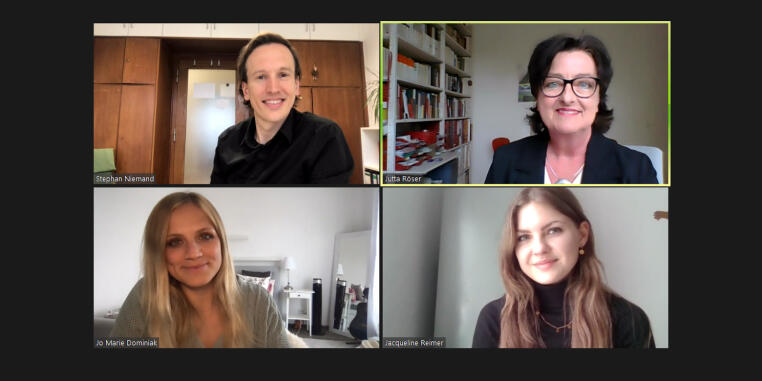

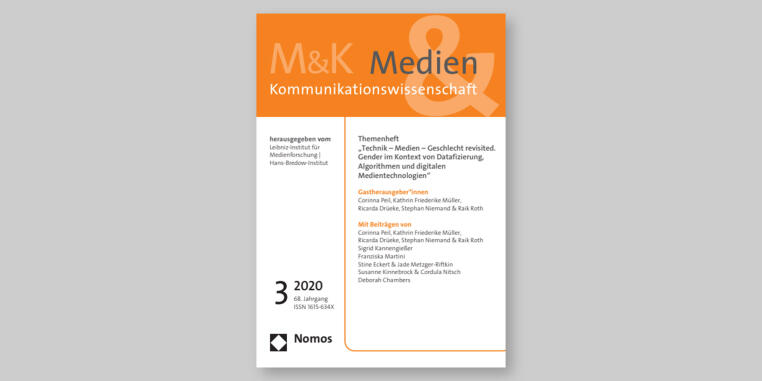

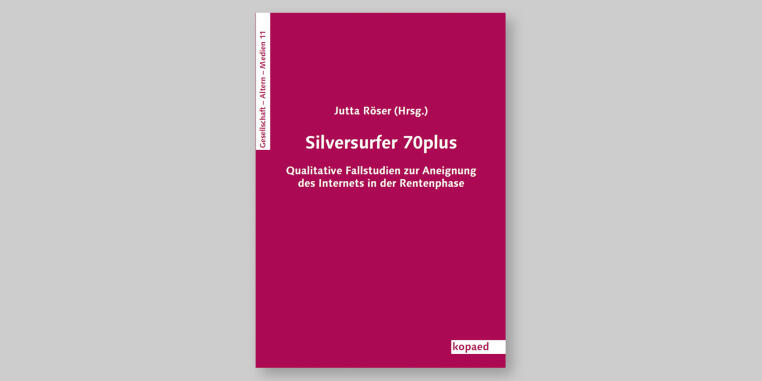
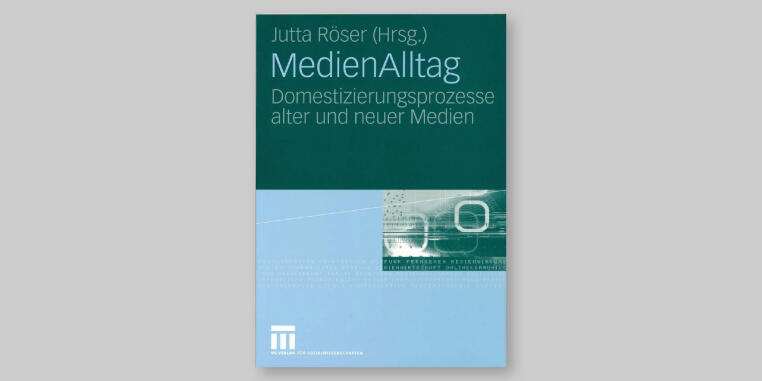
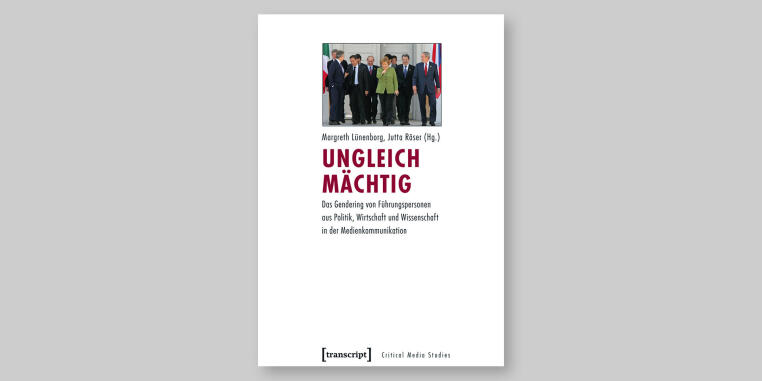







The chair of media sociology and media appropriation, headed by Prof. Dr. Jutta Röser, focuses on media appropriation and the interwoven relationship between media change and social transformation from a sociological perspective. Empirically, the research focuses on qualitative methods specializing in media ethnography. Characterized by a variety of different methods and research instruments, the ethnographic approach provides an in-depth understanding of media appropriation and media usage in everyday life. Therefore, the chair primarily conducts research concerning the following five focal points:
(1) Reception Studies, Media Appropriation and Qualitative Methods
(2) Mediatization of Society and Everyday Life
(3) Domestication of Media Technologies in History and Present
(4) Migration, Religion and Social Inequality
(5) Cultural Studies and Gender Media Studies
| Röser, Jutta, Prof. Dr. | +49 251 83-24266 | |
| Dominiak, Jo Marie, M.A. | +49 251 83-23013 | |
| Niemand, Stephan Dr. | +49 251 83-24263 | |
| Reimer, Jacqueline, M.A. | +49 251 83-21201 |
On the basis of qualitative interviews with grandparents and grandchildren, support systems practiced between the generations in the appropriation of digital media technologies are being researched. Migrant and non-migrant families are being included.
Keywords: family intergenerational relationships, media generations, migrant families, "warm expert" concept, participation in digital society, digital divide, media literacy, senior citizens
In-house project - Prof. Dr. Jutta Röser & Jacqueline Reimer
Several teaching research projects examine the reception of media representations of Muslims and media coverage of Islam. Numerous content analyses indicate that Muslims and Islam are largely reported in a context of violence and conflict. However, little is known about how media representations of Islam are actually percepted. Starting from this desideratum, the research projects will use qualitative methods to investigate a) how modes of reception differ along central categories (religious identity/gender/education) and b) what these modes of reception ultimately state about social cohesion.
Head of project – Dr. Stephan Niemand
In her dissertation, Jo Marie Dominiak examines dynamics and transitions within the use and appropriation of music media, both in relation to the present and from a historical perspective. Based on insights of the mediatization approach the project aims to investigate dynamic changes within the everyday use of music media, while also putting the significance of other context factors, such as media economics, power relations and media technologies into perspective. Ultimately, the study wants to decipher in what ways the everyday use and appropriation of music media drive and dynamically affect mediatization processes and music media change.
In her dissertation, Raik Roth examines the meaning and (re-)production of gender differences in the domestic internet appropriation of couples. Starting point of the study was the observation within the qualitative panel study (see project on The Mediatized Home below) that there were only very few females within the couple relationships that showed a certain expertise within internet appropriation. Instead, the majority of couples showed that either the men used the internet in a leading role or both partners used the Internet on an equal footing - while activities relating to hardware and repairing mostly remained the men’s task. From a constructivist perspective, the dissertation analyzes how and under what specific conditions these gender constellations are created by the couples in the appropriation processes and how they change between 2008 and 2013 in the course of the emergence of mobile internet technologies.
The internet has spread massively through its domestication: How did these processes of acquisition and appropriation actually play out? How did couples incorporate the Internet into their everyday lives, what specific changes did mobile technologies bring and how have communication cultures changed? These and other questions are answered by the qualitative long-term panel study of couple households funded by the DFG. In ethnographically oriented household studies, a systematically compiled sample of 25 couples was asked about their domestic media usage and appropriation between 2008 and 2016. These finding are complemented by consulting 16 couples of the online avantgarde in 2016.
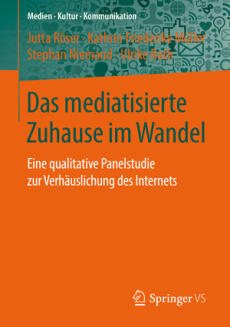
The study was carried out as part of four DFG-funded projects. It was a subproject of the DFG program "Mediatized Worlds".
An overall evaluation was published in 2019:
Röser, Jutta/Müller, Kathrin Friederike/Niemand, Stephan/Roth, Ulrike (2019): Das mediatisierte Zuhause im Wandel. Eine qualitative Panelstudie zur Verhäuslichung des Internets. Wiesbaden: Springer VS.
Reviews of the book have appeared in M&K and Publizistik as well as in rkm-journal.
Stephan Niemand’s dissertation represents the first systematic analysis of the interwoven effect between transitions in everyday life such as parenthood, moving house or new partnerships and the usage of media. Based on an ethnographically-oriented panel study that consulted 25 couple households, it is precisely worked out how and why such transition phases and changes in the everyday structure trigger profound change in the domestic media use. Thus, the study provides a deeper understanding of the interrelationship between everyday life and media usage, including the question of why media use changes in the course of life. Focusing on particular transitions and changes in everyday life, a new and promising research perspective for communication and media studies is opened up.
Niemand’s dissertation was published in 2020 and was awarded twice, winning the dissertation award of the WWU Münster for excellent doctoral theses and the dissertation award granted by the Sociology of Media Communication section of the DGPuK (German Society for Media and Communication Studies).
Stephan Niemand (2020): Alltagsumbrüche und Medienhandeln. Eine qualitative Panelstudie zum Wandel der Mediennutzung in Übergangsphasen. Wiesbaden: Springer VS.
The project presents qualitative findings on silver surfers aged 70 and older who only started using the Internet within their retirement phase. It shows how senior citizens discovered and appropriated the Internet and how they currently use and experience it. The findings particularly unfold the diverse access points to the internet within the group of the elderly: approaching the internet through volunteering, following suggestions from children and grandchildren who live far away or using the internet in order to keep up with current trends and social developments. The findings are based on a joint project by the participating authors as part of a one-year master’s research seminar at the University of Münster. In this context, 19 detailed qualitative interviews with silver surfers, 70 years of age or older, were carried out in their homes. In addition to these detailed evaluations, the book on the project contains media-ethnographic portraits of all respondents. The portraits show the headstrong and motivated way in which the silver surfers integrate the internet into their everyday lives.
The book on the research project, funded by means of MedienAlumni, was published in 2017:
Röser, Jutta (Hg.) (2017): Silversurfer 70plus. Qualitative Fallstudien zur Aneignung des In-ternets in der Rentenphase. München: kopaed.
Reviews of the book have appeared in Publizistik and M+K.
First and foremost, the project dealt with the media representation of women and men in top-level positions. Two content analysis were able to show how often female and male executives appear in the media and what features and characteristics they are attributed to. Secondly, the project focused on the users' interaction with the media: Young women and men were conducted to talk about their views on executives in the media. In a third step, the project unfolded the journalist’s perspectives, by dealing with media images and texts through interviews. The project answers the question of how gender-linked images of power and influence are produced with and through the media. Ultimately, the analysis reveal the continuation of traditional masculinity, as well as indicating forms of modernization of femininity within media discourses.
The project was carried out in cooperation with Margreth Lünenborg from the Free University of Berlin and funded by the BMBF. The book on the research project was published in 2012 in the series Cultural Media Studies.
Luenenborg, Margreth/ Roeser, Jutta/ Maier, Tanja/ Mueller, Kathrin Friederike (2011): Gender Analysis of Mediated Politics in Germany. In: Krunen, Tonny/Alvares, Claudia/ van Bauwel, Sofie (Ed.): Gendered Transformations. Theory and Practices on Gender and Media. [ECREA- Book Series] Bristol/Chicago: intellect, 57-75.
Lünenborg, Margreth/Röser, Jutta (Hrsg.) (2012): Ungleich mächtig. Das Gendering von Führungspersonen aus Politik, Wirtschaft und Wissenschaft in der Medienkommunikation. Bielefeld: transcript.